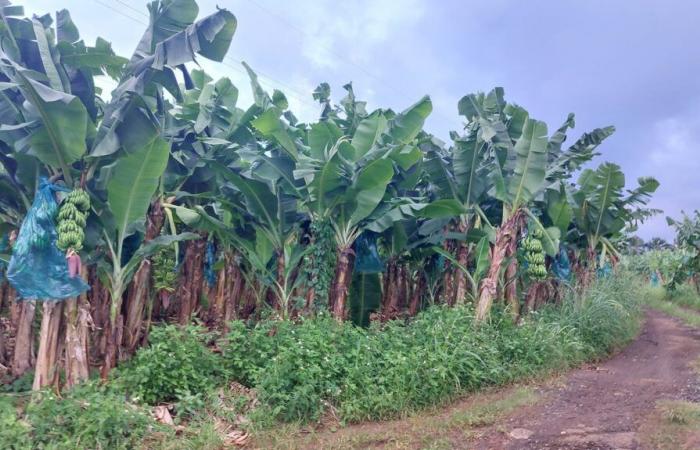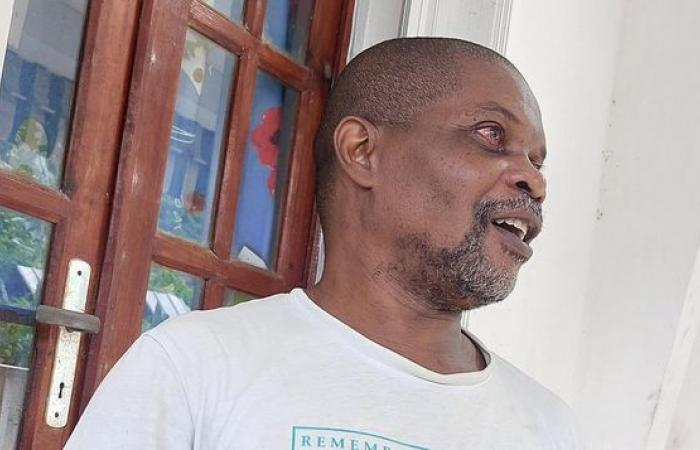In Guadeloupe, farm workers demanded compensation after decades of poisoning in banana fields. In the southwest of Guadeloupe, in the commune of Capesterre-Belle-Eau, the historic cradle of banana production on the island, Elin Jaffard, 58 years, grew bananas on the Blondinière plantation from 1988 to 2018. And regularly, to exterminate weevils in particular, he and his comrades spread pesticides including curlone-chlordecone with their bare hands and without any protection.
“It was in powder and grain form, like ground coffeehe remembers. I used the Round up, the Shootout, the Regent…Elin lists, all the most dangerous. We started in the morning and finished around noon. we were not informed. We didn’t know.”

Elin also remembers the little Cessna, the plane which, in the sky, took over from the workers by watering the fields with chlordecone while he and his comrades had a snack on the plot next door, breathing, remembers Elin , pesticides in full force. “It happened to me three times that I fell because of these products. We couldn’t stand the smell so we started to vomit”continues Elin.
“Our health has deteriorated over the years. I almost died. We were sacrificed.”
That is, Jaffardat franceinfo
Elin literally saw her family decimated. Three of his brothers worked on the plantation. There are 15 years old, the first died of stomach cancer, the second of pancreatic cancer, the last, like him, developed a prostate tumor. Elin had it removed in 2019, as evidenced by a long scar on her stomach. The man is physically broken, he can hardly see anymore. He just received his first compensation in October, two years after his illness was recognized: around 1 500 euros per quarter. He submitted his file in early 2022.
Since 2020, sick former banana workers have the right to be compensated, under conditions. But few of them take steps with the Pesticide Victims Fund. In four years, only 200 files have been received, the general directorate of health communicated to franceinfo. 84 in Guadeloupe, 114 in Martinique. A drop in the ocean compared to the potential number of patients in this region which has the world record rate of prostate cancer. Today, 154 workers had their files validated. Each quarter, they receive on average 2 616 euros. But some are still waiting for the money.
More than two years after having his prostate cancer recognized as an occupational disease, Tiburce Cléon has just received his first compensation. He worked on the Maleneck plantation from the age of 16 years. He is 69 today. Living without a prostate means living with urinary leakage and erectile dysfunction. “Many workers are ashamed, explains Tiburce in Creole. It’s difficult to get compensation. It takes time, there are lots of papers. You need to take care of yourself. At the same time, doctors are reluctant to recognize the disease. If you don’t get help, you get discouraged. I have cousins, colleagues in this story who have already had surgery but they don’t take the step. They are ashamed.”
In Guadeloupe, the CGT informs and helps workers prepare their files. For them, the public authorities are not doing enough to publicize and compensate. They rely exclusively on associations like Phyto-victimes which has just opened an office in Guadeloupe. But the association cannot do everything, explains Claire Bourasseau, one of the leaders. “Today, the law does not allow compensation other than for workers who have been exposed to pesticides and children who have been exposed in-utero via occupational exposure of their parents. Today compensation for occupational diseases overall are totally insufficient. We have been denouncing it for years. At no time have we said that we are here to repair the chlordecone scandal. I am doing it with the means given to me and with the means that I have. but I can’t do miracle.”
At the beginning of the year, the State recognized its responsibility in this health scandal via a law which, after the Assembly, is awaiting a vote in the Senate. In the crosshairs of this text, compensation for all West Indians who are direct victims of chlordecone, via pollution of soil, water, food, etc. According to studies, more than nine out of 10 West Indians carry the condition. pesticide.







